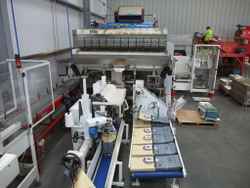
Posted to News on 9th Feb 2018, 12:33
Using Industry 4:0 to future-proof automation projects
In the UK, there are many companies that specialise in automation projects. Some design and provide the technology, components or sub systems, usually called Original Equipment Manufacturers (OEMs). Others provide the full turnkey applications. Then, there are system integrators that are specialists in crafting solutions, overseeing the engineering of automated systems, ensuring all the elements on a manufacturing and packing line work harmoniously together to optimise productivity, reduce waste and address rising manufacturing labour costs.

The additional focus for a manufacturer in considering an automation platform is ensuring each element of a turnkey packing, case loading and palletising line works together and is compatible with Industry 4.0.
A 2017 report from the EEF revealed there remains uncertainty about how Industry 4.0 can be applied to business. The report indicated that 61 per cent of manufacturers agree they could be using current digital technologies more effectively to boost productivity.
Not just for big companies
Pacepacker's Commercial & Information Systems Manager Paul Wilkinson explains how SME's should consider Industry 4.0 when selecting an automation platform. He says: "I believe that Industry 4.0 is starting to gain momentum with manufacturers developing a better picture of what the smart factory of the future might look like. Given that SMEs in the UK food sector account for 96 per cent of businesses, it's vital that enterprises of all sizes recognise that it isn't just for multinationals."
The main goal of Industry 4.0 is improving system connectivity to support better decision making. It enables seamless communications to and from higher level business systems for a fully integrated production.
Every device connected to the PLC is creating data, from the humblest field component to the most sophisticated variable speed drive. With 4.0 it's not about creating new information, just making it more accessible.
Organisations of all sizes, but especially SMEs, can start by exploring their established automation platforms to optimise productivity. Perhaps by using data logging and graphical display capabilities of an HMI to highlight factors that limit a line's running speed. By using the built-in web server now common in PLCs, HMIs, variable speed drives and more, factory managers can view an alarm generated by the control system to identify and schedule maintenance and minimise downtime.
Keeping up with technology
System integrators should have a wide breadth of experience from different industries, enabling them to share best practice from one application to another. Ideally, look for an integrator that will present several automation options for consideration at the early project stages, with different benefits, features and cost implications.
Paul cautions: "A less reputable integrator may recommend overly complex and expensive systems that they want the client to have, not the one that the client actually needs. These may be less flexible in the long run. An emerging requirement is for multi-functional and flexible equipment that can easily be reconfigured to future product cycles. As well as optimising OEE and ROI, much of this equipment is now compatible with future smart factory and Industry 4:0 trends."
Weigh up industry skillset
To help craft the right option for customers, Pacepacker offers a well-resourced engineering and project design team. Paul says: "It might sound obvious, but make sure you select a system integrator you feel comfortable collaborating with, who holds regular status meetings and will advise you on the elements that fall outside of your realm of expertise. Look for a good work ethic and ask about their customer satisfaction record." Industry awards are a good way to benchmark an integrators' credibility. Customer testimonials also help to instill confidence. Being able to see examples in operation, either at the integrators' demonstration facility or at a local customer site, can help in the decision making process. For example, Pacepacker's "Try Before You Buy' facility is a popular way for customers to run product trials and see bagging, case loading and palletising systems in action before placing an order.
Placing an order should just be the start of the integrators support. Educational workshops, open days and regular site visits, are more than just valuable extras, they can help to boost workforce awareness about automation, the future landscape and the long-term productivity benefits that can be realised.
For more information please go to www.pacepacker.com.
Want the latest machine building news straight to your inbox? Become a MachineBuilding member for free today >>
X
X
GLOBAL

















